Voice search is when you use your voice to interact with your device for finding the information you are looking for.
It is usually opposed to traditional (keyboard) search.
Voice search is still in the early days, but there is absolutely no doubt it will revolutionize the way we use our devices and access the web. Various voice-controlled gadgets (such as smartwatches, Smart TV, Amazon Echo, Google Home smart speakers) already play an important role in our daily routine.
To understand more about voice search, let’s look at the latest voice search statistics, trends, facts & data.
Voice Search Usage Statistics
Gone are the days when voice search was a rare thing to perform. Now, voice search is used by almost everyone, every day.
Much of its growth is credited to smart gadgets (like smart speakers) and mobile devices that offer built-in voice assistants like Google Assistant, and Siri. People are now using voice search in their cars, tablets, computers, and all sorts of other equipment and devices.
General Voice Search Statistics
Let’s look at some general voice search stats:
- In a study of 1,000+ users, more than half of the respondents (55%) said that they use voice search while looking for answers on their smartphones.
- 52.8% of voice search users use it while driving.
- 65% of users of the 25-49 age group converse with their voice-control gadgets every day.
- Voice searches account for 50% of all online searches and 30% of searches are done without a screen.The number of voice searches performed per month in 2018 was over one billion.
- Generally, voice search is used by a higher number of males than females once a month at the minimum.
- According to a study by Uberall, it was discovered that nearly 21% of people use voice search once a week.
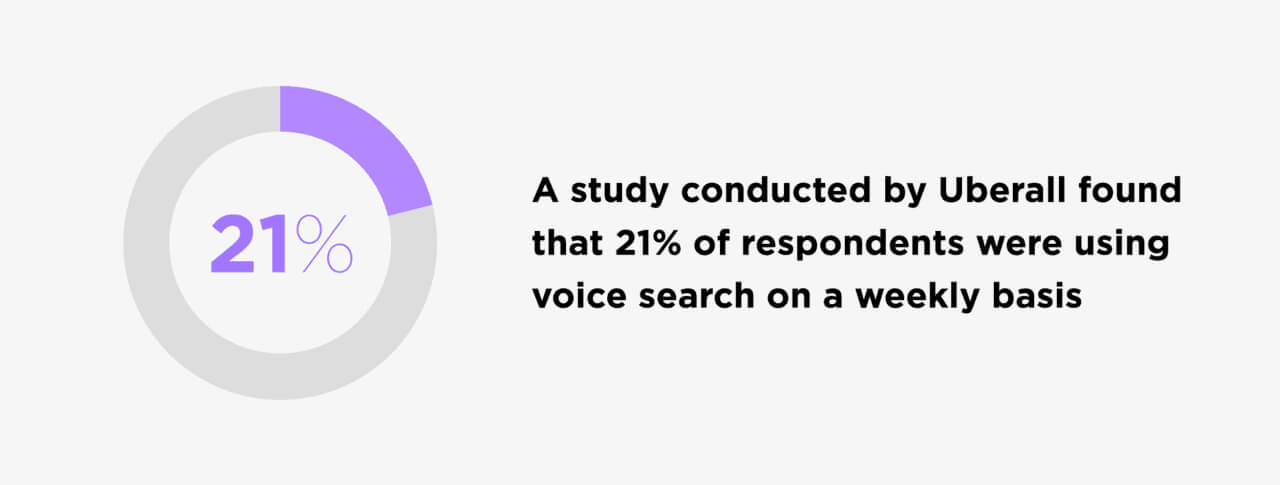
- Almost 50% of the people search for products using voice search.
- 85% of shoppers purchase products that Amazon suggests, labeled as “Choice” items. (Amazon Choice was released as a way to simplify Amazon voice queries on Echo devices and help the consumers to find what they are looking for)
- Voice search usage increased to 35 times between 2008 and 2016.
- According to a survey by HubSpot, 74% of subjects reported that they used voice search within the last month.
- Google voice search has the ability to accept the voice input in 15 languages and translate it into more than 50 different languages.
Voice Search Trends
People today prefer to have multiple smart speaker gadgets in their homes as voice search is not only simpler and faster but also far more convenient. This is why in this hands-free world, devices with voice recognition have been becoming highly popular.
- 24% of adults in the US have at least one smart speaker device in their homes.
- 47% of users have one smart speaker gadget.
- 24% of users have two smart speaker gadgets.
- 29% of users have three smart speaker gadgets.
- Over 50% of the users who use a voice assistant in their smartphone say they keep the voice search enabled on their smartphone all the time.

- 28% of individuals worry about privacy as well as data security in their smart speaker devices.
Trust continues to be a significant hindrance in the adoption of voice search. Many people have a constant suspicion about the protection of their important data.
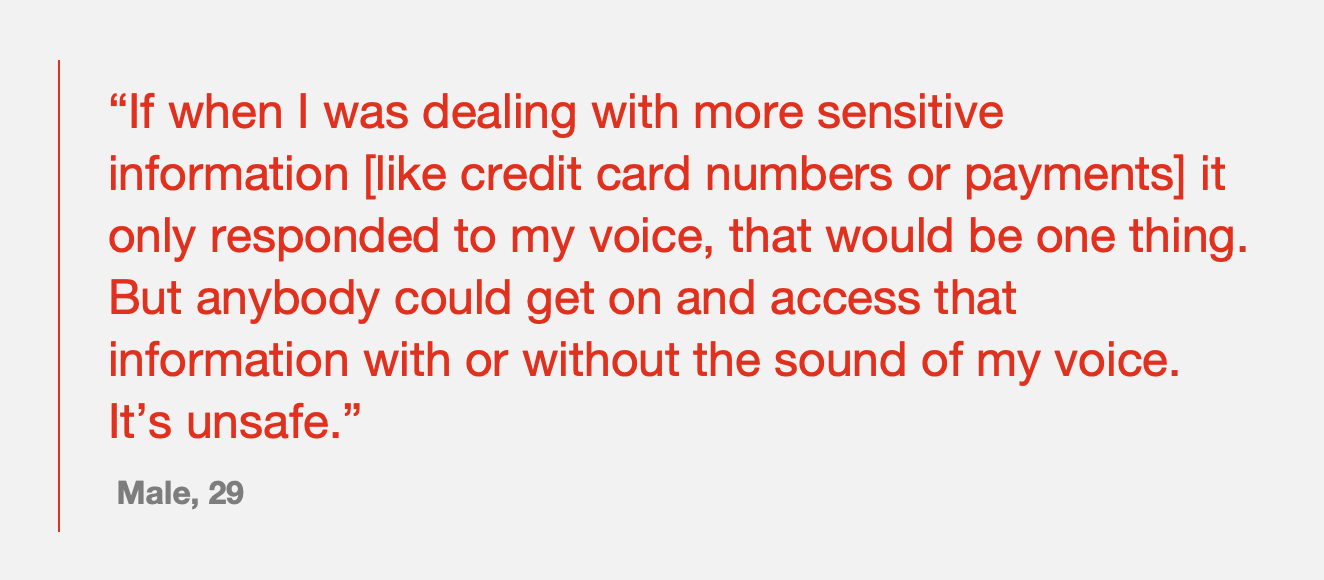
This is a concern that the companies have to deal with to make more people interested in the smart devices.
Voice Search Usage Trends
- 20% of smartphone and smart speaker gadget users use the voice assistant several times a day.
- While over 90% of consumers say that they are satisfied with their voice assistants, only 38% of users are happy with their voice assistants on smartphones.
- 44% of consumers mentioned that they look for voice search capability when shopping for smart devices (like TV, lights, alarm system, or doorbell).
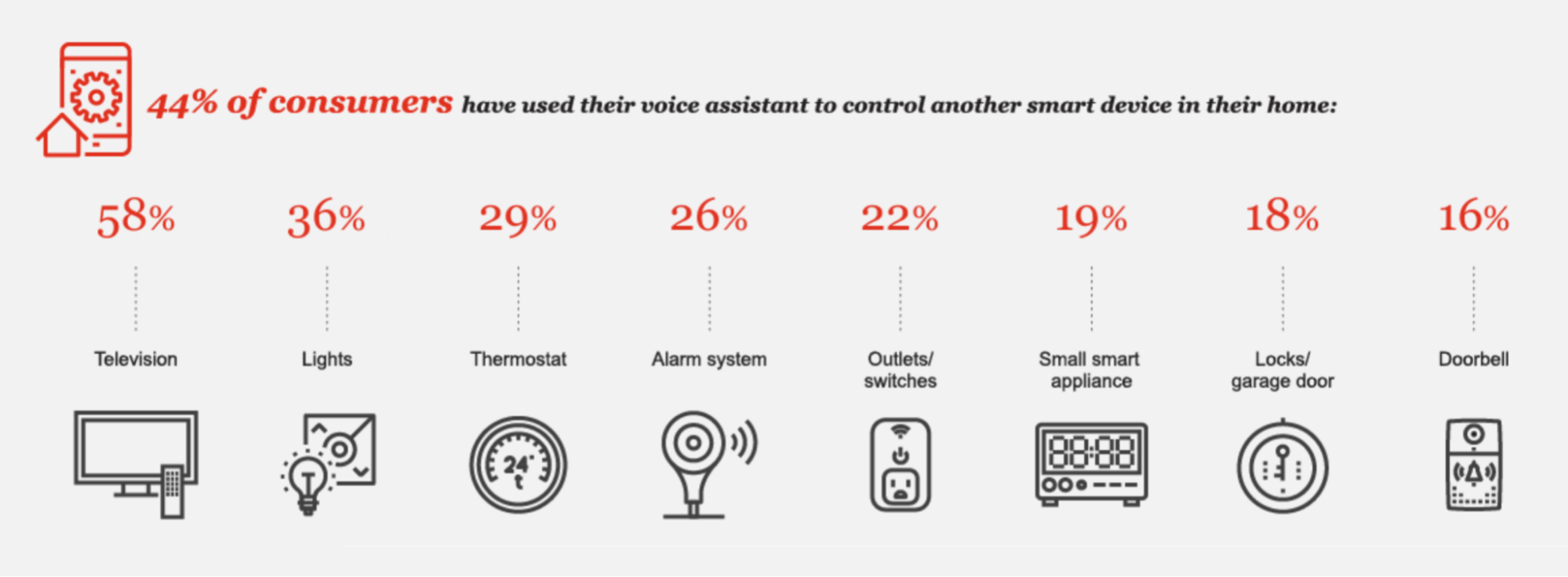
Voice Search Demography Based Trends
- People in the age group of 18-24 are moving to the voice search technology quicker than the older age groups.
- People in the age group of 25-49 are considered heavy consumers of voice search.
- Compared to before the COVID-19 outbreak, 50% of users in the 18-34 age group now use their smart speakers to listen to news and information.
It is pretty obvious that today’s youth is more inclined towards the digital world than the older people, and hence, they are moving to adopt voice search faster.
This could also result in having a kind of waterfall effect on the older age groups motivating them to understand the technology and its usage.
Voice Search SEO Statistics
If you are someone who works in digital marketing, you might be wondering how to take advantage of the growing voice search.
The following are the statistics of voice search related to search engine optimization that will help you in understanding this rising trend better…
- After examining 10k search results of Google Home, Brian Dean discovered that the pages searched using voice search generally take 4.6 seconds to load.
- 70.4% of the voice search result pages have HTTPS security.
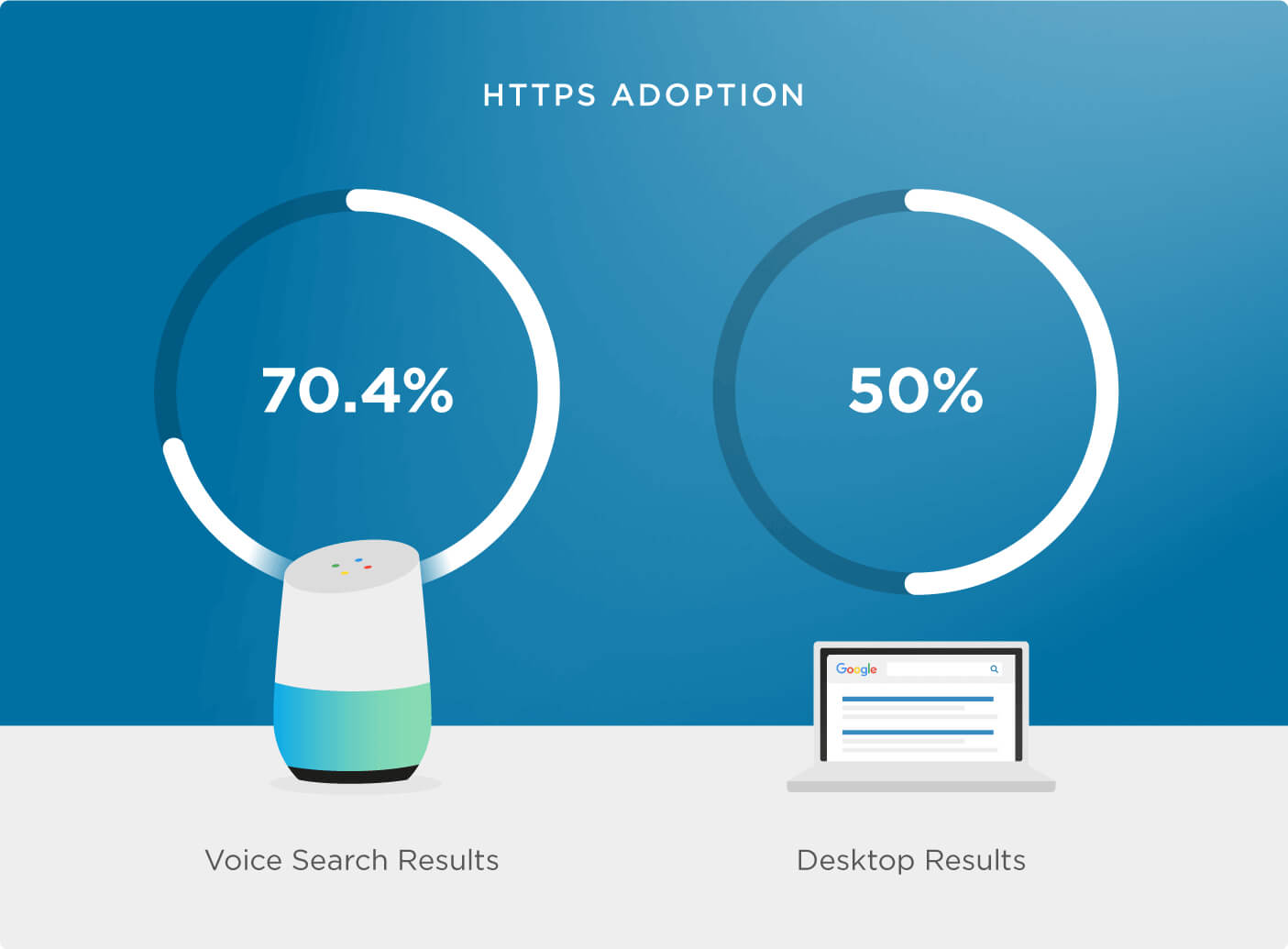
- A typical voice search result in Google usually has 29 words only, which means Google prefers short and concise answers to voice search queries.
- 36.4% of the results are pages that use Schema (structured data).
- Around 10% of the queries by voice search start as basic questions of 5W’s (what, who, where, when, why, and how) whereas, for the queries raised through text, it’s just 3.7%.
- Websites that have a high domain and link rating (two metrics developed by Ahrefs to assess a website’s overall authority) are likely to get ranked at the top in the context of voice search.
- Highly-shared content on social media is ranked nicely in voice search on Google. An average search result has 44 tweets and 1,199 shares on Facebook.
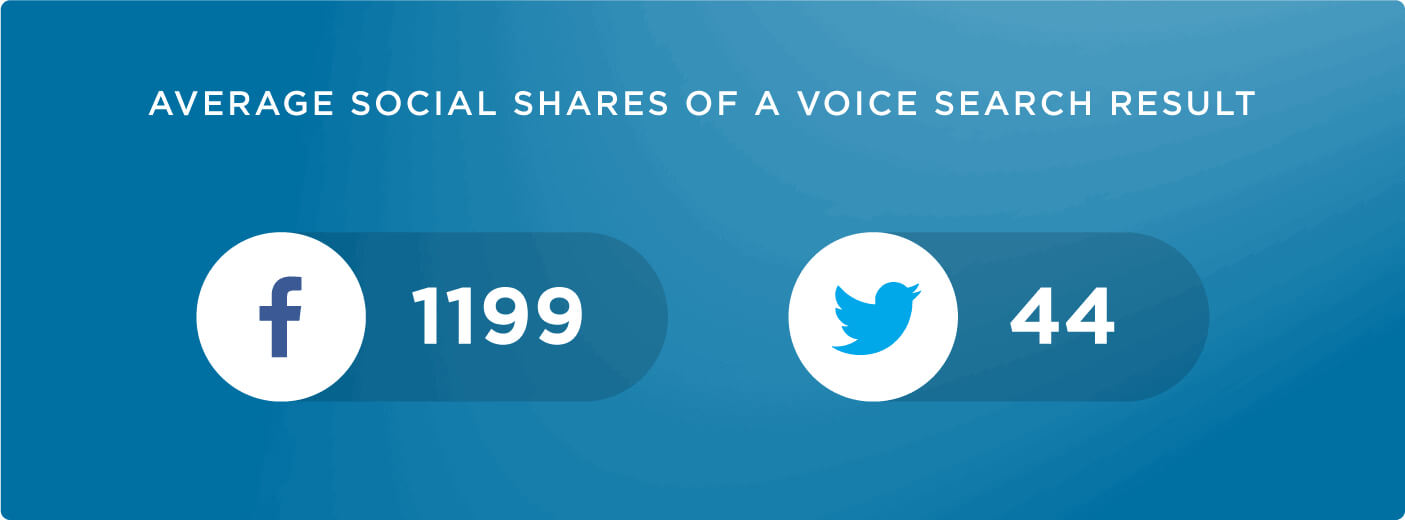
- The average voice search result is simple to understand and written in easy language, usually written at the reading level of 9th grade.
- Only 13% of all the Google searches are done using voice search as found by Econsultancy.
- 40.7% of the voice search results in Google are credited to Featured Snippet (we’ve tested and verified this too).
- The average result page on Google using voice search has approximately 2,312 words.

- Nearly 75% of the results using voice search get ranked in the top 3 for that particular query.
- Dentists make the top industry group that is optimized most for voice searches.
- The least optimized group is the agencies for consumer protection.
- The average query in voice search contains 4.2 words, whereas, for text searches, it is 3.2 words.
- Mobile voice searches, as compared to text searches, are 3 times more inclined to be based on the locale.
- 20% of queries on mobile phones are done through voice search.
- Virtual assistant Cortana makes 25% of desktop searches on Microsoft Windows 10.
Voice Search Device Trends
The overall awareness of voice-control gadgets is high now. Voice search has entered the US to the point where there are only a few user groups who are not familiar with this technology yet.
- Barely 10% of individuals are not yet familiar with voice-control appliances.
- 24% of individuals own TVs and TV remotes with voice assistants.
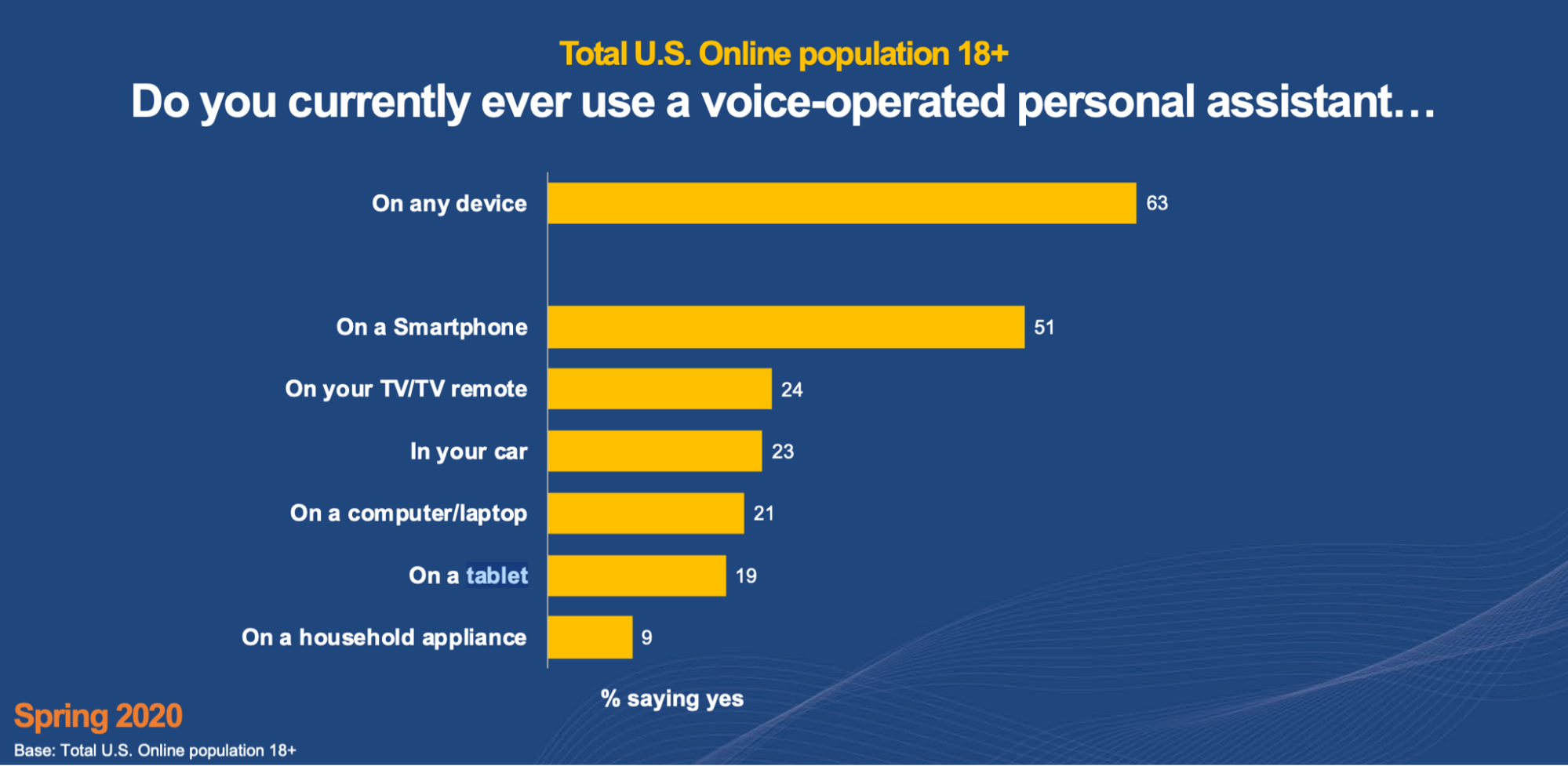
- 23% of individuals own cars with voice search capability.
- 21% of individuals own computers with voice search features.
- 19% of individuals own tablets with voice search features.
- 9% of individuals own household gadgets with voice search features.
User Preferences and Trends
- 61% of users informed that voice search is mainly helpful for them while their vision or hands are engrossed in some work.
- 52% of users keep their virtual assistants in their living rooms, 25% keep them in their bedrooms, and 22% keep them in their kitchens.
- 24% of people in the US have a voice-control smart speaker device at their home.
- Owners of smart speaker devices usually request an approximate number of 11 varied tasks every week.
Voice Search Predictions
Let’s have a look at some of the predictions for voice search…
- 55% of US households are predicted to buy at least one smart speaker gadget in 2022 (compared to 13% in 2017).
- Voice shopping is expected to become a $40 billion channel by 2022 (compared to $2 billion in 2017).
- The digital speakers market is expected to hit over $35 billion by 2025.
- By 2021, the voice search market is predicted to expand to over 5.11 billion digital voice assistants and over 8 billion devices by 2023.
- 61% of people in the 25-64 age group say that they will most likely use their voice search gadgets even more in the future.
- 71% of wearable gadget owners said that they think they will be using their devices even more in the future.
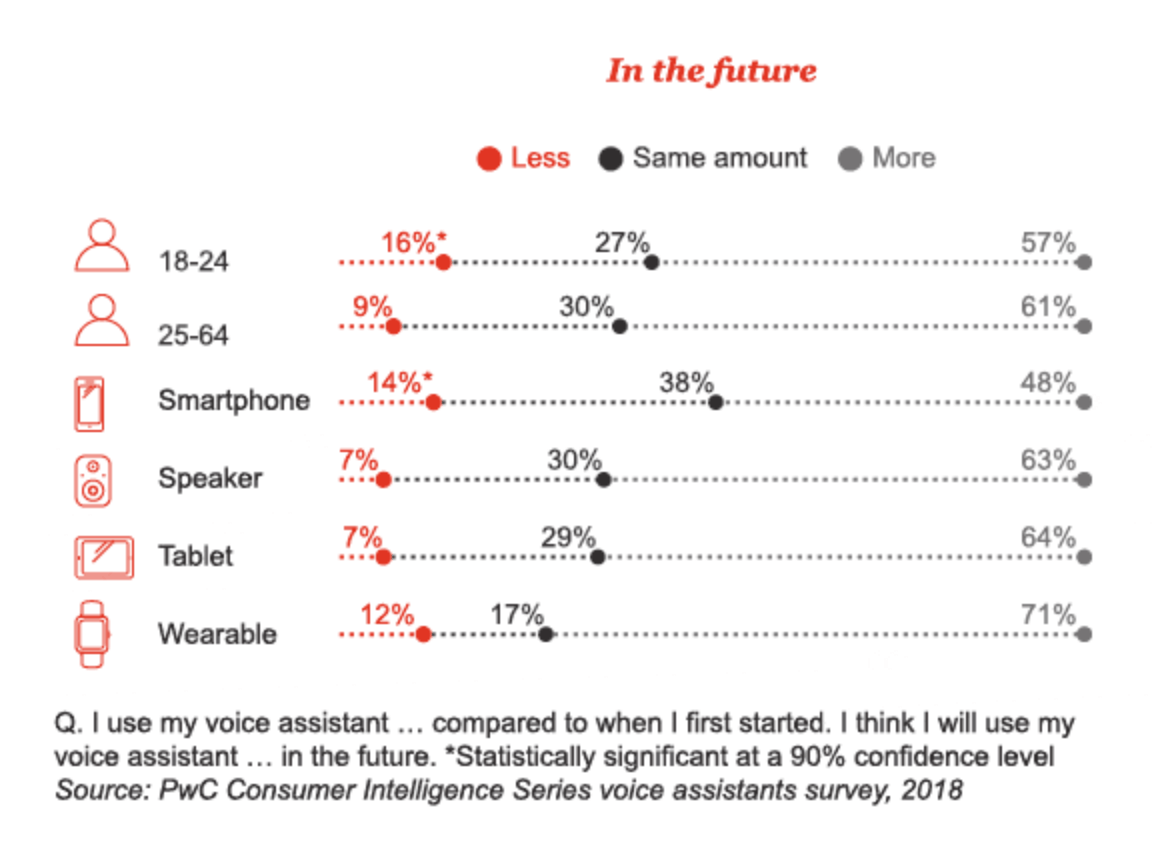
Conclusion
Voice search is an emerging trend that will be a significant factor in coming years in how people find content online. While it may not replace the traditional search any time soon, voice technology offers many advantages for users who need to multitask while being productive at work or on the go.
With the rise in voice search, it’s essential for marketers and business owners to understand and adapt according to how their customers are searching and what they’re looking for.
Now, what are your thoughts on voice search? Have you tried it out yet, and what were your experiences like? Let us know in the comments below.
You can also read our posts on WordPress Statistics, Video Marketing Statistics, Mobile Marketing Statistics, and Internet Statistics to find out everything about the latest digital trends and data.
Further reading:
- Content Marketing Statistics
- Video Marketing Statistics
- Internet Statistics
- Mobile Marketing Statistics
Sources
- https://www.perficient.com/insights/research-hub/voice-usage-trends
- https://www.socialmediatoday.com/news/106-fascinating-voice-search-facts-infographic/527108/
- https://www.pwc.com/us/en/services/consulting/library/consumer-intelligence-series/voice-assistants.html
- https://www.searchenginewatch.com/2019/04/18/voice-search-study-uberall/
- https://www.nationalpublicmedia.com/uploads/2020/04/The-Smart-Audio-Report_Spring-2020.pdf
- https://voicebot.ai/2019/02/14/juniper-estimates-3-25-billion-voice-assistants-are-in-use-today-google-has-about-30-of-them/
- https://www.prnewswire.com/news-releases/voice-shopping-set-to-jump-to-40-billion-by-2022-rising-from-2-billion-today-300605596.html
- https://www.thinkwithgoogle.com/advertising-channels/emerging-technology/voice-assistance-consumer-experience/
- https://searchengineland.com/google-reveals-20-percent-queries-voice-queries-249917
- https://www.bruceclay.com/blog/learn-how-to-optimize-for-voice-search-now/
- https://backlinko.com/voice-search-seo-study
- https://econsultancy.com/the-future-of-voice-search-2020-and-beyond/
- https://blog.hubspot.com/news-trends/artificial-intelligence-is-here
- https://www.kleinerperkins.com/perspectives/2016-internet-trends-report
- https://www.gartner.com/smarterwithgartner/gartner-predicts-a-virtual-world-of-exponential-change/
- https://www.statista.com/statistics/1233939/smart-speaker-penetration-us/

